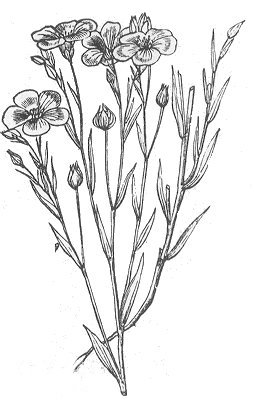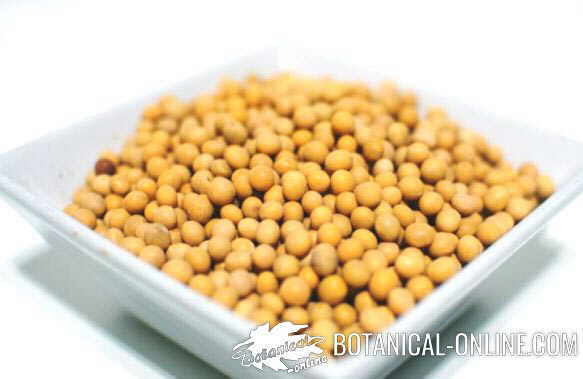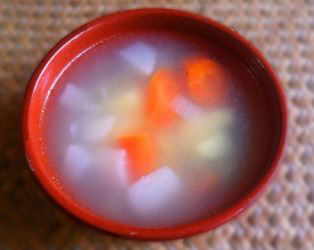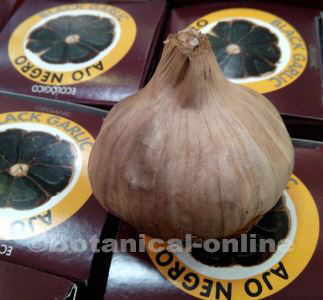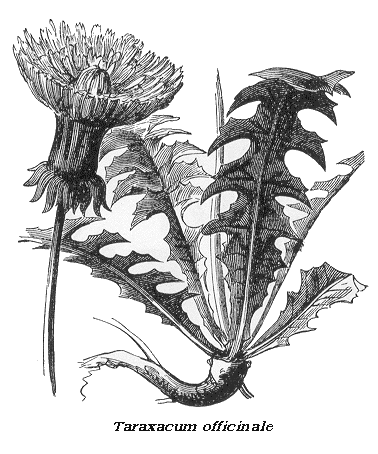Contents
- 1 CHICKPEA FOOD PROPERTIES
- 1.1 Nutritional value of chickpeas
- 1.2 What nutrients do chickpeas have?
- 1.3 Chickpeas are rich in lecithin and other essential fatty acids
- 1.4 Chickpeas for a healthy heart and good arteries
- 1.5 Folic acid and magnesium to improve heart health
- 1.6 Properties of potassium and magnesium for heart health
- 1.7 Chickpeas can control blood sugar levels
- 1.8 Are chickpeas good for people with diabetes?
- 1.9 More information on chickpeas.
CHICKPEA FOOD PROPERTIES
Nutritional value of chickpeas
Chickpeas (Cicer arietinum L.) are legumes with a large amount of protein. They are very important within vegetarian diets, in which they constitute a basic protein food, along with lentils and peas.
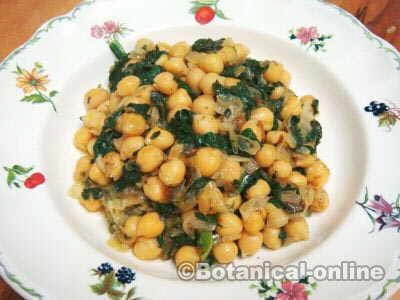 Photo of chickpeas with spinach
Photo of chickpeas with spinach
What nutrients do chickpeas have?
Chickpeas contain slowly absorbed carbohydrates and a large supply of fiber, making it a very satiating food.
Its vitamins include folic acid, which is needed to improve circulation and heart health.
In addition chickpeas contain many other B-complex vitamins (except B12), which nourish the nervous system.
One of the biggest advantages of chickpeas is their great wealth in minerals, mainly potassium, phosphorus, magnesium and calcium, iron and zinc.
Chickpeas are rich in lecithin and other essential fatty acids
One of the main features of chickpeas is their high richness of lecithin, a fat which has a great importance in the control of cholesterol and triglycerides, allowing to emulsify (mix) body fat with water, which favors fat expulsion.
Similarly, choline is formed from lecithin. Choline is considered a member of the B vitamins. It helps the liver to prevent or treat a variety of diseases that can affect it, such as cirrhosis, hepatitis, liver cancer or degradation of the liver caused by toxins.
The lecithin content in chickpeas is higher than in other legumes such as soybeans or peanuts. Peas, however, contain high levels of this component
Besides lecithin, chickpeas are rich in other essential fatty acids, among which linoleic acid, commonly called as Omega 6, stands out.
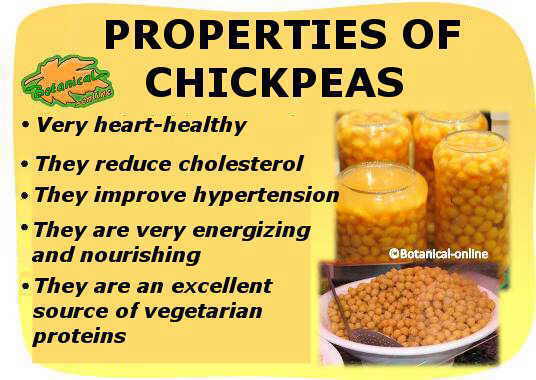
Main properties and benefits of chickpeas
Chickpeas for a healthy heart and good arteries
Comparative studies carried out in recent years have highlighted the importance of chickpea in the heart-healthy diet. Besides lecithin and essential fatty acids, we must refer to fiber. Although the total content of fiber (17, 4 g /100 g) is significantly lower than the majority of legumes containing more than 25%, chickpeas have a high proportion of fibers, particularly of soluble fibers.
It is widely known importance of this type of fiber in the control of cardiovascular diseases. The Mediterranean diet, which proposes a large intake of these foods along with fruits and vegetables, has been associated with the lowest incidence of circulatory diseases, compared with other diets that do not include high-fiber foods in a so important ratio.
Soluble fiber, besides being very important in the prevention of constipation, helps improve circulation because it absorbs cholesterol before being absorbed through the capillaries of the intestine. Soluble fiber forms a gel mass which is eliminated from the body through of feces, dragging cholesterol out.
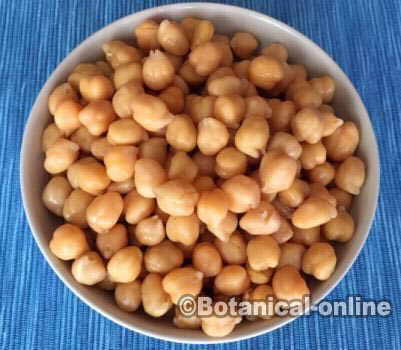 Photo of cooked chickpeas
Photo of cooked chickpeas
Folic acid and magnesium to improve heart health
Another components that also play an important role in prevention of bad cholesterol increment are folic acid, in the form of folate, and magnesium.
Everyone talks about the importance of folic acid (Vitamin B12) in pregnancy, as it prevents fetal bad formations. This justifies by itself the importance of introducing this food in the diet for pregnant women.
However, folic acid is also very important for the heart and arteries. Folic acid protects us by decreasing the level of homocysteine in the blood. High levels of homocysteine have been linked with an increased risk of heart attack, angina pectoris, or coronary heart disease. Chickpeas contain the greatest proportion of folic acid in legumes (557 mcg per 100 g dry weight)
Properties of potassium and magnesium for heart health
Magnesium helps to attain a better the elasticity of the veins, arteries or capillaries, which promotes circulation. There is evidence that a deficiency of this mineral may increase the risk of stroke.
Potassium is a mineral necessary for muscle contraction and therefore for the heartbeat. Increasing benefits of potassium for heart and hypertension are being discovered.
Chickpeas can control blood sugar levels
Chickpeas, like all other legumes, are characterized by their ability to gradually release glucose into the bloodstream. When we eat this vegetable, the glucose is gradually entering the blood. This control of blood sugar is very interesting for the control of diabetes and for the control of hunger.
Are chickpeas good for people with diabetes?
Keeping sugar levels within normal range without needing too much insulin: This is very interesting for people with diabetes and need to control blood sugar levels. Consuming this food can make them less dependent on the insulin supply.
Chickpeas have been found to possess many anti-glycemic components. Among them we will mention the following: ascorbic, salicylic and nicotinic acids, minerals such as chromium or manganese, and other components such as pectin, niacin or tryptophan.
* More information: Chickpeas for diabetes


